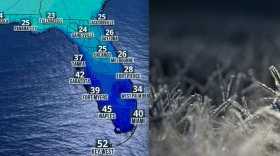At noon on a Tuesday, El Gran Taco Loco should be packed. Instead, owner Mauricio Martinez sits alone among rows of empty benches where families once sat for lunch.
"Look what's going on right now. This is the peak time," Martinez said through interpreter Dr. Sigfredo Hernandez. "Do you see any activity? It's affecting everything."
Martinez's restaurant is one of several businesses along Old U.S. 41 reporting customer losses. Martinez remembers one Sunday morning clearly. Two unmarked cars pulled into his parking lot at lunchtime.
"We were working like any other normal day," he said in Spanish to Hernandez. "They started talking to people in the parking lot and also with the workers inside the business, and they took them away. In fact, they even grabbed customers that were in the parking lot."
But the decline started long before agents showed up that day. Since early 2025, Martinez watched his customer base shrink as immigration enforcement whispers increased throughout Bonita Springs.

Hernandez, a retired business professor, spent Aug. 7-18 visiting businesses between Shangri-La Road and Wilson Street on Old U.S. 41. He interviewed owners and managers at 44 locations: 11 restaurants or fast-food establishments, seven grocery stores, and a mix of laundromats, barber shops, convenience stores and other retail shops. Every business owner answered the same question: Have the number of customers increased, decreased or remained the same after immigration raids?

"I wanted to document the impact of the immigration raids," Hernandez said. "Not only the cost to families and individuals, but also the economic cost."
Thirty-six businesses, or 82%, reported fewer customers. Of those, 18 said business was down 50% or more, 11 reported declines between 25% and 40%, and one reported a 20% drop. Hernandez shared his findings with WGCU and later helped translate interviews with Spanish-speaking owners. The survey also found businesses reducing employee hours and payroll, which translates to lower payroll tax revenue for local government.
Martinez built El Gran Taco Loco over 10 years and expanded to five more locations. Sales are down 40% since January. He cut workers' hours. It wasn't enough. Now he's planning to close more than half of his restaurants.

"I'm completely frustrated," he said through Hernandez. "I cannot do much."
Nabil Youssef has owned Tisch Laundromat for more than 30 years. He knows his regulars by face, if not by name. Business is down 50%. Those familiar faces have disappeared.
"It's a shame that this has taken place this way," Youssef said. "Illegal, are they? That's beyond our reach. But are they criminals? No. I could leave my wallet here all day, nobody will pick it up. So, I don't call them criminals. They're hardworking people."
At Mix-Teca Mini Market, owner Erica Mendoza has noticed a shift in purchasing patterns. Celebratory items like piñatas and special candies remain untouched.

"People are afraid, and not only are they afraid, but they're just buying essential things," Mendoza said through Hernandez. "I used to sell a lot of products that are not considered essential." Her sales have decreased 20%.
Carlos Landeros, owner of Vikingos Restaurant, has seen similar changes in customer behavior. Especially from families that used to dine in to watch football games.
"It's the fear that an ICE raid will come into the business and take them away," Landeros said through Hernandez. "That's why many of them come over just to take the food out instead of spending time enjoying themselves in my restaurant." He's had to lay off employees to adjust to declining revenue.
"It's a heavy weight on my shoulders because there's fewer customers and less sales," said. "We had to make adjustments to try to make ends meet."

The question for Old U.S. 41 businesses is whether this represents a temporary downturn or a permanent economic shift. Youssef feels uncertain about the future.
"I just wish that things were different, that people won't be living in fear," he said. "It's terrible for the economy. Everybody's paying the price here. I just wish that we could go back to where we were, be happy and live in peace."
With Martinez planning to close more than half his restaurants, he'll be eliminating jobs he spent a decade creating. Down the street, other business owners face similar calculations about how long they can sustain losses before closing their doors.
WGCU is your trusted source for news and information in Southwest Florida. We are a nonprofit public service, and your support is more critical than ever. Keep public media strong and donate now. Thank you.







